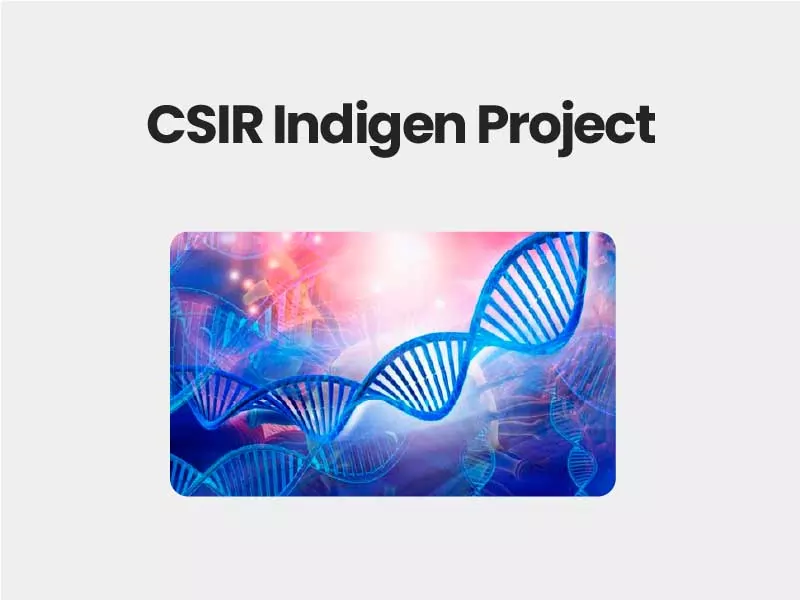Companion@360 → 7 Month programme to sharpen your writing skills → REGISTER NOW

CSIRs Indigen Project
It was implemented by the CSIR-Institute of Genomics and Integrative Biology (IGIB), Delhi and CSIR-Centre for Cellular and Molecular Biology (CCMB), Hyderabad.
This has enabled benchmarking the scalability of genome sequencing and computational analysis at population scale in a defined timeline.
The ability to decode the genetic blueprint of humans through whole genome sequencing will be a major driver for biomedical science.
Benefits:
- Epidemiology of genetic diseases to enable cost effective genetic tests.
- Carrier screening applications for expectant couples.
- Enabling efficient diagnosis of heritable cancers.
- Pharmacogenetic tests to prevent adverse drug reactions
Need for genome sequencing:
Genome sequencing is figuring out the order of DNA nucleotides, or bases, in a genome—the order of As, Cs, Gs, and Ts that make up an organism’s DNA. The human genome is made up of over 3 billion of these genetic letters.
- The outcomes of the IndiGen will be utilized towards understanding the genetic diversity on a population scale, make available genetic variant frequencies for clinical applications and enable genetic epidemiology of diseases.
- It is important to ensure that India, with its unparalleled human diversity, is adequately represented in terms of genomic data and develops indigenous capacity to generate, maintain, analyse, utilize and communicate large-scale genome data, in a scalable manner.
Contributions:
- To understanding the “Indian Genome Variation”.
- Pioneering collaborations in genomics has been fostered by CSIR both nationally and internationally.
- The first personal human genome in India and in understanding ancestral population in India and early migrations that led to what we know today on distinct ethnic groups.
- CSIR also pioneered the application of genomics in clinical settings in the area of rare genetic diseases in India by means of DNA/Genome based diagnostics and interaction with large number of clinical collaborators.
Applications:
- CSIR conducts Whole Genome Sequencing of over 1,000 Indians for Biomedical Applications.
- predictive and preventive medicine with a faster and efficient diagnosis of rare genetic diseases.
- The whole-genome data and know-how for the analysis of largescale genomic data is expected to enable evidence and aid in the development of technologies for clinical and biomedical applications in India.
Conclusion:
- The IndiGenome card and accompanying IndiGen mobile application that enables participants and clinicians to access clinically actionable information in their genomes.
- It ensures privacy and data security, which is vital for personal genomics to be implemented at scale.
- This is being pilot tested in individuals across India and has evinced interest from several Indian commercial organisations.
Read Also Budget 2022-2023
